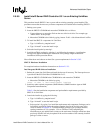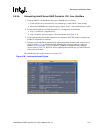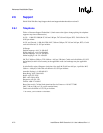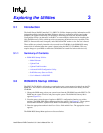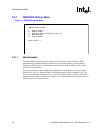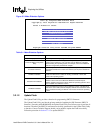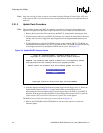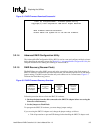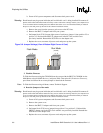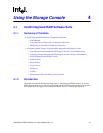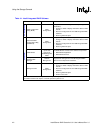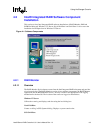
3-4 Intel® Server RAID Controller U3-1 User’s Manual Rev 1.0
Exploring the Utilities
Note: Only one card can be in the system at a time when using the Firmware Update Utility. FUU only
works with one IOP. If two are found an error message indicates that two are found and that you
must exit.
3.2.1.3 Update Flash Procedure
Note: This procedure assumes that SRCU31 hardware is functional. No jumper setting changes are
required. The update flash procedure requires that the array and volumes are in normal status.
1. Back up the data from the disk connected to the SRCU31 adapter before updating the flash.
2. Get the firmware update for your SRCU31 hardware. For example, download the bin file from
the Intel web site onto a floppy disk: http://support.intel.com/support/motherboards/server/
srcu31
3. To flash the firmware using the CD-ROM, boot the system with the SRCU31 CD-ROM. At
the Main Menu enter number 2 (Update Flash) and hit Enter. The splash message and opening
screens appear followed by the Update RAID Firmware screen. See Figure 3-3.
Figure 3-3. Update RAID Firmware Screen
4. Insert the diskette containing the firmware update image into the floppy drive A:. Select the
Update RAID Firmware (Figure 3-3) option and hit Enter to initiate the process of
downloading the firmware update image from the floppy disk to the flash on your SRCU31
hardware. If the program cannot find the file on the floppy disk inserted in drive A, then the
Update Flash Utility Could Not Find Firmware Update File screen appears.
The RAID Firmware Download Successful screen is shown in Figure 3-4.
5. Remove the CD-ROM from the CD-ROM drive and reboot the system to use the new
firmware update.
Intel (R) Integrated RAID - Firmware Update Utility
Copyright(c) Intel Corporation 1998-99 All Rights Reserved
Please insert the diskette with the firmware update file into A:
Highlight selection using arrow keys and press ENTER.
Cancel
Update RAID Firmware
WARNING: The existing RAID system firmware will be completely erased
and replaced with new firmware during the upgrade process.




